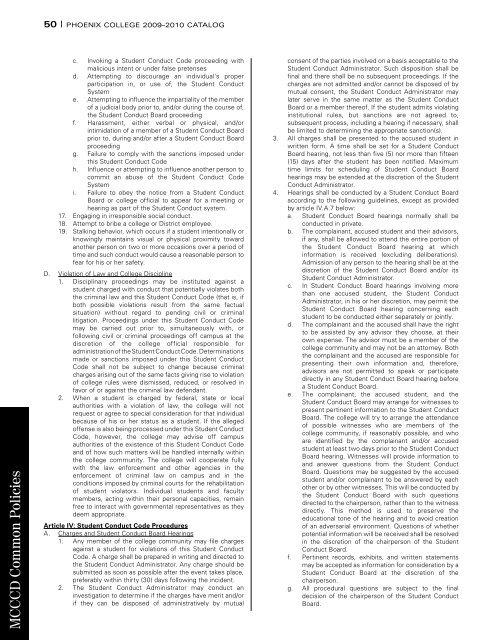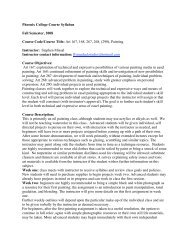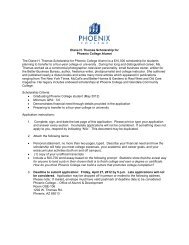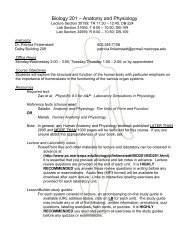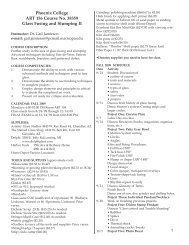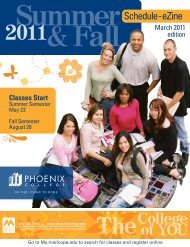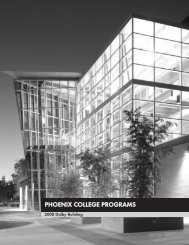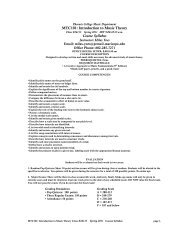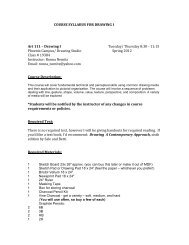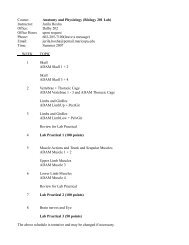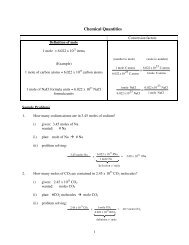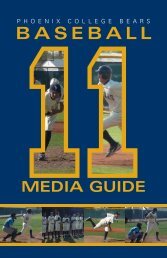Phoenix College Catalog 2009-10
Phoenix College Catalog 2009-10
Phoenix College Catalog 2009-10
You also want an ePaper? Increase the reach of your titles
YUMPU automatically turns print PDFs into web optimized ePapers that Google loves.
50 | <strong>Phoenix</strong> <strong>College</strong> <strong>2009</strong>–20<strong>10</strong> CATALOG<br />
MCCCD Common Policies<br />
c. Invoking a Student Conduct Code proceeding with<br />
malicious intent or under false pretenses<br />
d. Attempting to discourage an individual's proper<br />
participation in, or use of, the Student Conduct<br />
System<br />
e. Attempting to influence the impartiality of the member<br />
of a judicial body prior to, and/or during the course of,<br />
the Student Conduct Board proceeding<br />
f. Harassment, either verbal or physical, and/or<br />
intimidation of a member of a Student Conduct Board<br />
prior to, during and/or after a Student Conduct Board<br />
proceeding<br />
g. Failure to comply with the sanctions imposed under<br />
this Student Conduct Code<br />
h. Influence or attempting to influence another person to<br />
commit an abuse of the Student Conduct Code<br />
System<br />
i. Failure to obey the notice from a Student Conduct<br />
Board or college official to appear for a meeting or<br />
hearing as part of the Student Conduct system.<br />
17. Engaging in irresponsible social conduct.<br />
18. Attempt to bribe a college or District employee.<br />
19. Stalking behavior, which occurs if a student intentionally or<br />
knowingly maintains visual or physical proximity toward<br />
another person on two or more occasions over a period of<br />
time and such conduct would cause a reasonable person to<br />
fear for his or her safety.<br />
D. Violation of Law and <strong>College</strong> Discipline<br />
1. Disciplinary proceedings may be instituted against a<br />
student charged with conduct that potentially violates both<br />
the criminal law and this Student Conduct Code (that is, if<br />
both possible violations result from the same factual<br />
situation) without regard to pending civil or criminal<br />
litigation. Proceedings under this Student Conduct Code<br />
may be carried out prior to, simultaneously with, or<br />
following civil or criminal proceedings off campus at the<br />
discretion of the college official responsible for<br />
administration of the Student Conduct Code. Determinations<br />
made or sanctions imposed under this Student Conduct<br />
Code shall not be subject to change because criminal<br />
charges arising out of the same facts giving rise to violation<br />
of college rules were dismissed, reduced, or resolved in<br />
favor of or against the criminal law defendant.<br />
2. When a student is charged by federal, state or local<br />
authorities with a violation of law, the college will not<br />
request or agree to special consideration for that individual<br />
because of his or her status as a student. If the alleged<br />
offense is also being processed under this Student Conduct<br />
Code, however, the college may advise off campus<br />
authorities of the existence of this Student Conduct Code<br />
and of how such matters will be handled internally within<br />
the college community. The college will cooperate fully<br />
with the law enforcement and other agencies in the<br />
enforcement of criminal law on campus and in the<br />
conditions imposed by criminal courts for the rehabilitation<br />
of student violators. Individual students and faculty<br />
members, acting within their personal capacities, remain<br />
free to interact with governmental representatives as they<br />
deem appropriate.<br />
Article IV: Student Conduct Code Procedures<br />
A. Charges and Student Conduct Board Hearings<br />
1. Any member of the college community may file charges<br />
against a student for violations of this Student Conduct<br />
Code. A charge shall be prepared in writing and directed to<br />
the Student Conduct Administrator. Any charge should be<br />
submitted as soon as possible after the event takes place,<br />
preferably within thirty (30) days following the incident.<br />
2. The Student Conduct Administrator may conduct an<br />
investigation to determine if the charges have merit and/or<br />
if they can be disposed of administratively by mutual<br />
3.<br />
4.<br />
consent of the parties involved on a basis acceptable to the<br />
Student Conduct Administrator. Such disposition shall be<br />
final and there shall be no subsequent proceedings. If the<br />
charges are not admitted and/or cannot be disposed of by<br />
mutual consent, the Student Conduct Administrator may<br />
later serve in the same matter as the Student Conduct<br />
Board or a member thereof. If the student admits violating<br />
institutional rules, but sanctions are not agreed to,<br />
subsequent process, including a hearing if necessary, shall<br />
be limited to determining the appropriate sanction(s).<br />
All charges shall be presented to the accused student in<br />
written form. A time shall be set for a Student Conduct<br />
Board hearing, not less than five (5) nor more than fifteen<br />
(15) days after the student has been notified. Maximum<br />
time limits for scheduling of Student Conduct Board<br />
hearings may be extended at the discretion of the Student<br />
Conduct Administrator.<br />
Hearings shall be conducted by a Student Conduct Board<br />
according to the following guidelines, except as provided<br />
by article IV.A.7 below:<br />
a. Student Conduct Board hearings normally shall be<br />
conducted in private.<br />
b. The complainant, accused student and their advisors,<br />
if any, shall be allowed to attend the entire portion of<br />
the Student Conduct Board hearing at which<br />
information is received (excluding deliberations).<br />
Admission of any person to the hearing shall be at the<br />
discretion of the Student Conduct Board and/or its<br />
Student Conduct Administrator.<br />
c. In Student Conduct Board hearings involving more<br />
than one accused student, the Student Conduct<br />
Administrator, in his or her discretion, may permit the<br />
Student Conduct Board hearing concerning each<br />
student to be conducted either separately or jointly.<br />
d. The complainant and the accused shall have the right<br />
to be assisted by any advisor they choose, at their<br />
own expense. The advisor must be a member of the<br />
college community and may not be an attorney. Both<br />
the complainant and the accused are responsible for<br />
presenting their own information and, therefore,<br />
advisors are not permitted to speak or participate<br />
directly in any Student Conduct Board hearing before<br />
a Student Conduct Board.<br />
e. The complainant, the accused student, and the<br />
Student Conduct Board may arrange for witnesses to<br />
present pertinent information to the Student Conduct<br />
Board. The college will try to arrange the attendance<br />
of possible witnesses who are members of the<br />
college community, if reasonably possible, and who<br />
are identified by the complainant and/or accused<br />
student at least two days prior to the Student Conduct<br />
Board hearing. Witnesses will provide information to<br />
and answer questions from the Student Conduct<br />
Board. Questions may be suggested by the accused<br />
student and/or complainant to be answered by each<br />
other or by other witnesses. This will be conducted by<br />
the Student Conduct Board with such questions<br />
directed to the chairperson, rather than to the witness<br />
directly. This method is used to preserve the<br />
educational tone of the hearing and to avoid creation<br />
of an adversarial environment. Questions of whether<br />
potential information will be received shall be resolved<br />
in the discretion of the chairperson of the Student<br />
Conduct Board.<br />
f. Pertinent records, exhibits, and written statements<br />
may be accepted as information for consideration by a<br />
Student Conduct Board at the discretion of the<br />
chairperson.<br />
g. All procedural questions are subject to the final<br />
decision of the chairperson of the Student Conduct<br />
Board.


